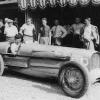I believe that turbos did more to damage road racing than any other single factor I can think of. It seems something might have been learned after what it did to the Can-Am... F1 going back to normally aspirated in '89 brought on a great era, lasting through '95, maybe the last one. Limiting to 10 cylinders in '96 just lost something (beyond just the two cylinders ;) )
Very interesting to be reminded of the early-'70s configurations in regards to trap speeds. I recall a figure of 246 but think that was Arie again, either in '90 or more likely later — but it makes perfect sense that 1971 speeds would be huge (as would be driver attachments). I'd love to see if you can find a figure for any of the eras we're discussing.
Thanks for your great recall and knowledge. 
Thanks for your input too. And to others of course as well.
I don't think turbo technology to be wrong at all. in fact I like it way over bigblocks. I have much more respect for a reliable highboost F1 engine the I ever had and will have for bigblock Detroit iron. 5 liters and more is simply not in line with the curent times anymore. And powerwise you don't need it, given the current state of chassis engineering in both F1 and sportscars.
I mentioned things have gone worng because of turbos but let's nor forget that at the end of the true Gp C era we were dealing with 7 liter V12's and 5 liter V8 with turbos. Way more powerful then with what Gp C started back in 1982. It was a bit remeniscent to the 34-37 era in GP racing. One limit was supposed to keep engine power within reasonable limits (750 kg car weight) but improved technology allowed 600 and more HP monsters on motorcyle tires... Something similar happened in GP C thanks to development on engine management controls (motoronic) and turbos. Especially the influences of the developments on these engine management controls must not be overlooked. The late 80's engines were much more fuel efficient that the early 80's engines were, thanks to them.
I think that with, say 5 liter atmo and 3 liter turbo we would have seen decent and reasonable engines. For turbo: restrict them to prevent the out of control situation we had in Indycars in '73 and F1 from 1985 on.
The kind of performances Mclaren Honda achieved with a 1.5 turbo in '88 were neat and challenging too.
For passenger cars, Personally I believe the future is to turbos. a big lump V8 in traffic jam consumes more fuel the a smaller engine with turbo that can produce more power (up to levels of the bigger block) when it is needed thanks to the turbo assisting.
Combine it with hybrid technology for the lower RPM's and you get a decent alternative on Detroit-like dinosaur technology of more than half a century ago.
Using such technology in racing could enhance this technology.
Besides that: For example: NASCAR using 5.8 liter engines but on superspeedways using restrictor plates in order to cut back radically on their power to control speeds: Then you're using a much too large engine to begin with. For what reason? Only just to let these engines be big? And loud?
Now that plea definitely falls on: literally: deaf ears anyway.....
Another rediculous trend: introducing KERS for a `green` image to compensate for the development of blown diffusers: going even so far that even when the cars must slow down the engine is still tuned to burn as much fuel as possible to activate this blown diffuser. Fuel used for enhancing aerodynamics.....
Makes no sense to me in conjunction with using KERS for a more green image....
if I know more about the Indy speed traps, I'll be back with that
Henri



















